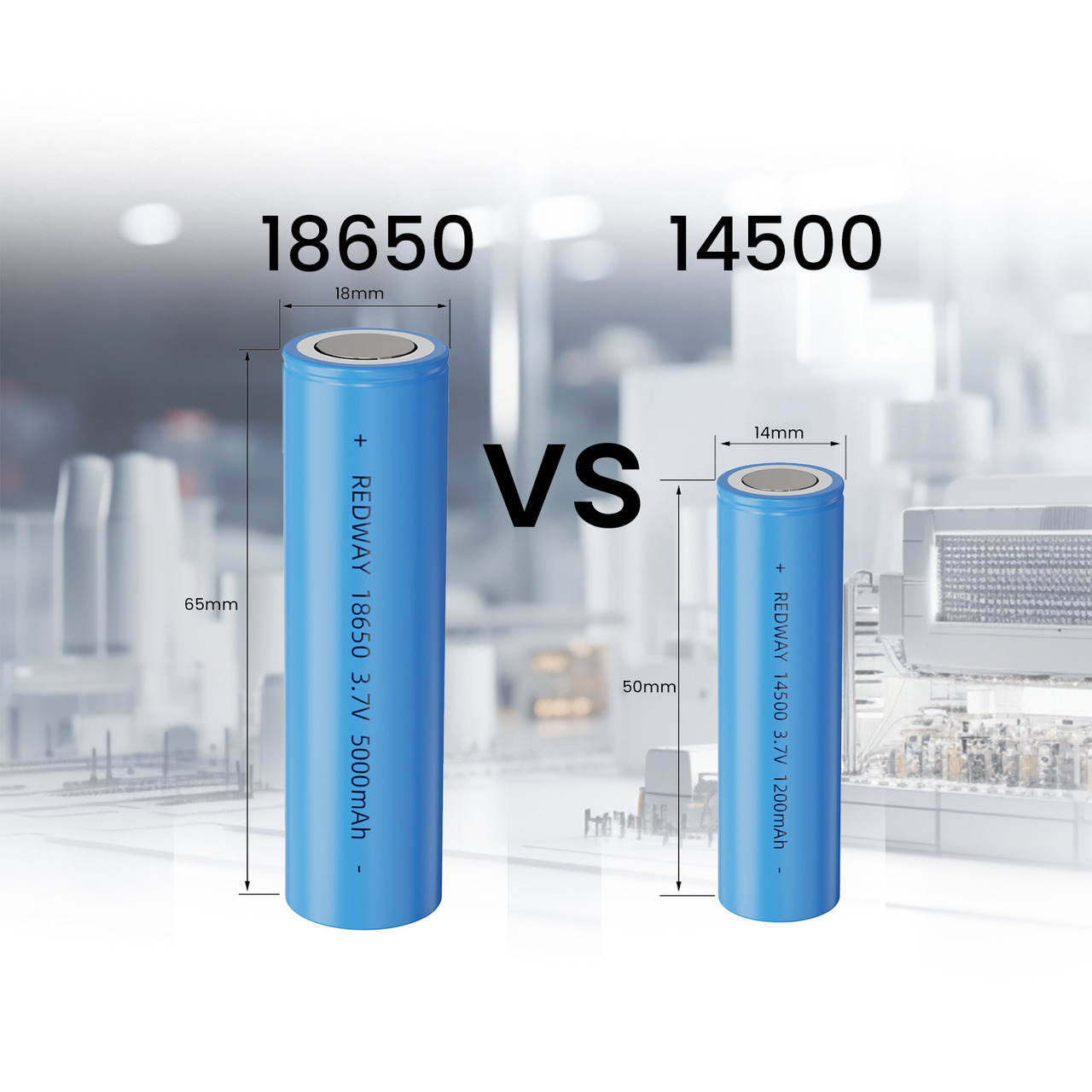If you're into electronics or portable devices, you've likely encountered the dilemma of choosing between different battery types. Two common options are the 18650 and 14500 batteries. These lithium-ion powerhouses are renowned for their reliability and performance, but they differ significantly in size, capacity, and applications. Let's delve into the details to understand which one suits your needs better.

Physical dimensions and capacity comparison
Size and shape
18650 batteries are cylindrical with a diameter of 18mm and a length of 65mm, while 14500 batteries are smaller, measuring 14mm in diameter and 50mm in length.
Capacity and energy density
18650 batteries typically offer higher capacities ranging from 1500mAh to 3500mAh, providing more energy storage compared to 14500 batteries, which usually have capacities between 600mAh to 1200mAh.
Voltage and current output
Nominal voltage
Both batteries have a nominal voltage of 3.7 volts, making them suitable for various applications requiring consistent power output.
Maximum discharge current
18650 batteries generally have higher maximum discharge currents, allowing them to deliver more power when needed compared to 14500 batteries.
Applications and common uses
From consumer electronics to high-performance devices, both battery types find their place in various applications.
Consumer electronics
18650 batteries are commonly used in laptops, power banks, and electric vehicles due to their high capacity and reliability.
Flashlights and portable devices
14500 batteries are favored for their compact size and lightweight, making them ideal for powering flashlights, remote controls, and small gadgets.
Vaping devices
Both battery types are popular choices for vaping mods, with 18650 batteries preferred for extended usage between charges and 14500 batteries for their smaller form factor in compact devices.
Advantages and disadvantages
Advantages of 18650 batteries
18650 batteries offer high capacity and energy density, providing longer runtime for devices. However, their larger size and weight may not be suitable for all applications.
Advantages of 14500 batteries
14500 batteries are praised for their compact size and lightweight, making them perfect for portable devices. Nevertheless, their lower capacity and energy density might require more frequent recharging.
Safety considerations
Risk of overheating and explosion
Both battery types carry the risk of overheating and explosion if mishandled or subjected to extreme conditions. Proper usage and storage are essential to mitigate these risks.
Proper handling and storage
Users should follow manufacturer guidelines for charging, discharging, and storing lithium-ion batteries to ensure safety and longevity.
Cost comparison
Initial purchase cost
18650 batteries may have a higher initial purchase cost due to their larger capacity and popularity, while 14500 batteries are generally more affordable.
Long-term value
Considering the lifespan and performance, 18650 batteries may offer better long-term value despite the initial investment.
Environmental impact
Materials used
Both battery types contain materials like lithium, cobalt, and nickel, which require careful recycling to minimize environmental impact.
Recycling options
Proper disposal and recycling of lithium-ion batteries are crucial to prevent pollution and conserve valuable resources.
Choosing the right battery for your needs
Factors to consider
When selecting between 18650 vs 14500 Battery, consider factors such as capacity, size, weight, and intended use to find the most suitable option.
Personal preferences and priorities
Your personal preferences, budget, and priorities will ultimately guide your decision in choosing the right battery for your devices.
Future trends in battery technology
Advancements in lithium-ion technology
Ongoing research and development aim to improve the performance, safety, and sustainability of lithium-ion batteries, promising even better options in the future.
Emerging alternatives
Alternative battery technologies like solid-state batteries and lithium-sulfur batteries are gaining attention for their potential to surpass traditional lithium-ion batteries in terms of energy density and safety.
Conclusion
In the battle of 18650 vs 14500 batteries, each has its strengths and weaknesses. While 18650 batteries offer higher capacity and energy density, 14500 batteries shine with their compact size and lightweight design. Choosing the right battery depends on your specific needs, preferences, and the demands of your devices.
FAQs
Can I use an 18650 battery in place of a 14500 battery?
While physically possible in some cases, it's crucial to check voltage, size, and compatibility with your device before making the switch.
Are 14500 batteries safer than 18650 batteries?
Both battery types pose similar risks if mishandled. Proper usage, charging, and storage are essential for safety regardless of the battery size.
How long do 18650 batteries last compared to 14500 batteries?
The lifespan of both batteries depends on factors like usage patterns, charging cycles, and storage conditions. Generally, 18650 batteries tend to last longer due to their higher capacity.
Can I recycle 18650 and 14500 batteries?
Yes, lithium-ion batteries can be recycled to recover valuable materials like lithium, cobalt, and nickel. Many recycling facilities accept these batteries for proper disposal.
What are the potential risks of using counterfeit batteries?
Counterfeit batteries may lack proper safety features, leading to risks of overheating, explosion, and damage to devices. It's advisable to purchase batteries from reputable sources to ensure quality and safety.
